Alexey Leonov
Topic: Biography
 From HandWiki - Reading time: 10 min
From HandWiki - Reading time: 10 min
Alexey Leonov | |
|---|---|
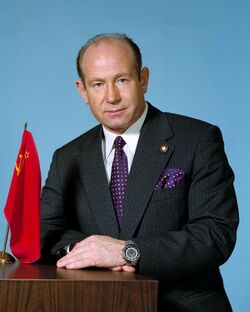 Alexey Leonov in April 1974 | |
| Born | Alexey Arkhipovich Leonov 30 May 1934 Listvyanka, West Siberian Krai, Russian SFSR, Soviet Union |
| Status | Retired |
| Nationality | Soviet, Russian |
| Occupation | Fighter pilot, Cosmonaut |
| Awards | Template:Hero of the Soviet Union Template:Hero of the Soviet Union
|
| Space career | |
| Soviet cosmonaut | |
| Rank | Major General, Soviet Air Force |
Time in space | 7d 00h 32 m |
| Selection | Air Force Group 1 |
Total EVAs | 1 |
Total EVA time | 12 minutes, 9 seconds |
| Missions | Voskhod 2, Soyuz 19/ASTP |
Mission insignia | File:ASTP-patch.png |
| Part of a series of articles on the |
| Soviet space program |
|---|
 |
Alexey Arkhipovich Leonov (Russian: Алексе́й Архи́пович Лео́нов; born 30 May 1934) is a retired Soviet/Russian cosmonaut, Soviet Air Forces Major general, writer and artist. On 18 March 1965, he became the first human to conduct extravehicular activity (EVA), exiting the capsule during the Voskhod 2 mission for a 12-minute spacewalk.
Biography
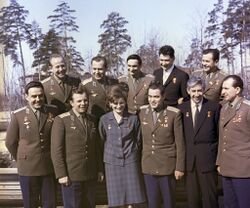
Leonov was born in Listvyanka, West Siberian Krai, Soviet Union. He was one of the 20 Soviet Air Force pilots selected to be part of the first cosmonaut group in 1960. Leonov was a member of the Communist Party of the Soviet Union (the only cosmonaut that was not was Konstantin Feoktistov). His walk in space was originally to have taken place on the Voskhod 1 mission, but this was cancelled, and the historic event happened on the Voskhod 2 flight instead.[1] He was outside the spacecraft for 12 minutes and nine seconds on 18 March 1965, connected to the craft by a 5.35-meter tether. At the end of the spacewalk, Leonov's spacesuit had inflated in the vacuum of space to the point where he could not re-enter the airlock. He opened a valve to allow some of the suit's pressure to bleed off and was barely able to get back inside the capsule.[2] Leonov had spent eighteen months undergoing intensive weightlessness training for the mission. As of March 2017, Leonov is the last survivor of the five cosmonauts in the Voskhod programme.
In 1968, Leonov was selected to be commander of a circumlunar Soyuz 7K-L1 flight. This was cancelled because of delays in achieving a reliable circumlunar flight (only the later Zond 7 and Zond 8 members of the programme were successful) and the Apollo 8 mission had already achieved that step in the Space Race with the United States gaining that prestige first. He was also selected to be the first Soviet person to land on the Moon, aboard the LOK/N1 spacecraft.[1] This project was also cancelled. (The design required a spacewalk between lunar vehicles, something that contributed to his selection.) Leonov was to have been commander of the 1971 Soyuz 11 mission to Salyut 1, the first manned space station, but his crew was replaced with the backup after one of the members, cosmonaut Valery Kubasov, was suspected to have contracted tuberculosis (the other member was Pyotr Kolodin).
Leonov was to have commanded the next mission to Salyut 1[3], but this was scrapped after the deaths of the Soyuz 11 crew members, and the space station was lost. The next two Salyuts (actually the military Almaz station) were lost at launch or failed soon after, and Leonov's crew stood by. By the time Salyut 4 reached orbit, Leonov had been switched to a more prestigious project.
Leonov's second trip into space was similarly significant: he commanded the Soviet half of the 1975 Apollo-Soyuz mission – Soyuz 19 – the first joint space mission between the Soviet Union and the United States.
From 1976 to 1982, Leonov was the commander of the cosmonaut team ("Chief Cosmonaut") and deputy director of the Yuri Gagarin Cosmonaut Training Center, where he oversaw crew training. He also edited the cosmonaut newsletter Neptune. He retired in 1992.[1]
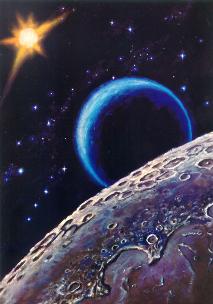
Leonov is an accomplished artist whose published books include albums of his artistic works and works he did in collaboration with his friend Andrei Sokolov. Leonov took coloured pencils and paper into space, where he sketched the Earth and drew portraits of the Apollo astronauts who flew with him during the Apollo–Soyuz Test Project.[4][3] Arthur C. Clarke wrote in his notes to 2010: Odyssey Two that, after a 1968 screening of 2001: A Space Odyssey, Leonov pointed out to him that the alignment of the Moon, Earth, and Sun shown in the opening is essentially the same as that in Leonov's 1967 painting Near the Moon, although the painting's diagonal framing of the scene was not replicated in the film. Clarke kept an autographed sketch of this painting—which Leonov made after the screening—hanging on his office wall.[5]
Together with Valentin Selivanov, Leonov wrote the script for the 1980 science fiction film The Orion Loop.
In 2001, he was a vice president of Moscow-based Alfa-Bank and an adviser to the first deputy of the Board.[6]
In 2004, Leonov and former American astronaut David Scott began work on a dual biography/history of the Space Race between the United States and the Soviet Union. Titled Two Sides of the Moon: Our Story of the Cold War Space Race, it was published in 2006. Neil Armstrong and Tom Hanks both wrote introductions to the book.
Leonov was also a contributor to the 2007 book Into That Silent Sea by Colin Burgess and Francis French, which describes his life and career in space exploration.
Honours and awards
- Twice Hero of the Soviet Union (23 March 1965; 22 July 1975)[1]
- Pilot-Cosmonaut of the USSR (1966)[1]
- Order for Merit to the Fatherland, 4th class (2 March 2000) - for his contribution to the state in the development of manned space flight
- Order of Friendship (12 April 2011) - for outstanding contribution to the development of the national manned space flight and many years of fruitful social activities
- Two Orders of Lenin
- Order of the Red Star
- Order for Service to the Homeland in the Armed Forces of the USSR, 3rd class
- Jubilee Medal "Twenty Years of Victory in the Great Patriotic War 1941-1945"
- Jubilee Medal "40 Years of the Armed Forces of the USSR"
- Jubilee Medal "50 Years of the Armed Forces of the USSR"
- Jubilee Medal "60 Years of the Armed Forces of the USSR"
- Jubilee Medal "70 Years of the Armed Forces of the USSR"
- Medal "Veteran of the Armed Forces of the USSR"
- Medals "For Impeccable Service", 1st, 2nd and 3rd classes
- USSR State Prize (1981) (with AV Filipchenko)
- Lenin Komsomol Prize (1979) - for the book-album "Man and the Universe" (with AK Sokolov)
- Honoured Master of Sport of the USSR (1965)
Foreign awards
- Hero of Socialist Labour (People's Republic of Bulgaria, 1965)
- Hero of Vietnam
- Hero of Labour (Democratic Republic of Vietnam, 1966)
- Order of Karl Marx (German Democratic Republic, 1966)
- Order of Georgi Dimitrov (People's Republic of Bulgaria)
- Order of the Banner of the Hungarian People's Republic
- Order of Merit, 3rd class (Ukraine, 12 April 2011) - for his significant personal contribution to the development of space industry, advances in the creation and implementation of space systems and technologies, professional excellence
- Medal A. Becker.
- Order "For Merit", 1st class (Syria, 1966)
Public organizations
- "Gold Medal partisan" (Italy, 1967)
- International Air & Space Hall of Fame inductee (2000)[7]
- Ludwig Nobel Prize (2007)
- Elmer A. Sperry Award (USA, 2008)
- Order of Saint Constantine the Great (Union of the Golden Knights of the Order of St. Constantine the Great)
- Order "Golden Star" (Foundation Heroes of the Soviet Union and Heroes of the Russian Federation together with the organizing committee of the International Forum "The potential of the nation").
- Order the "Pride of Russia" (Foundation for the "Pride of the Fatherland", 2007).
- National Award "To the glory of the Fatherland" in the "Glory to Russia" (International Academy of Social Sciences and International Academy of patronage, 2008).
- Order "the glory of the Fatherland", 2nd class (2008)
Other awards and titles
- Honorary Citizen of: Belgorod, Vologda, Kaliningrad, Kaluga, Kemerovo, Nalchik, Perm; Arkalyk (Kazakhstan), Kremenchug (Ukraine), Veliko Tarnovo, Vidin, Svishtov (Bulgaria), Usti nad Labem (Czech Republic), San Antonio (Chile)
- Reward edged weapon — a nominal officer Dirk "Alexei Leonov"
- Commander of the Order of St. Anne III degree from the head of the Russian Imperial House Maria Vladimirovna Romanova (2008)
- Commander of the Order of St. Anne II degree from the head of the Russian Imperial House Maria Vladimirovna Romanova (2011)
- Honorary Member of the Russian Academy of Fine Arts
Legacy
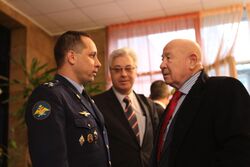
- A crater on the far side of the moon was named after Leonov in 1970,[8] near Mare Moscoviense (Sea of Moscow).
- Arthur C. Clarke's novel 2010: Odyssey Two was dedicated to Leonov and Andrei Sakharov; the fictional spaceship Cosmonaut Alexei Leonov in the book was named after him.
- Leonov wore a Russian Poljot "FMWF Strela" watch (a transliteration of СТРЕЛА, which actually means "Arrow") chronograph during his historic first space walk.
- At an Apollo-Soyuz Test Project press conference, Leonov stated (in English) that, while in the United States for ASTP training, he wanted to visit Hollywood, because he had aspirations of being a movie star. (He then joked, "I don't want [to be a movie star] ... Tom Stafford want!")
- Leonov, along with Rusty Schweickart, Vitaly Sevastyanov, and Georgi Grechko established the Association of Space Explorers in 1984. Membership is open to all people who have flown in outer space.
- In the Star Trek novel Destiny: Gods of Night there is a ship named the U.S.S. Alexey Leonov, which is sacrificed to save the planet Korvat from the Borg.
- Leonov is featured as a character in the 2013 Doctor Who comic book story "Space Oddity", published by IDW Publishing.
- The film The Age of Pioneers (2017) is based on Leonov's account about Voskhod-2 mission. Leonov was portrayed by Evgeny Mironov.
- The song "E.V.A" by Public Service Broadcasting on their 2015 album The Race for Space references Leonov becoming the first man to undertake Extra-Vehicular Activity in space.
Stamps
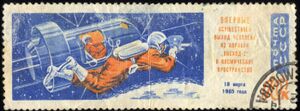
1965
- Alexey Leonov on Soviet Union 1965 Stamp 10 kopeks
- Soviet Union 1965, 6 kopeks
- Soviet Union 1965 with Pavel Belyayev
- Albania 1965 twice 6 and 20, with Pavel Belyayev
- Albania 1965
- Bulgaria 1965 with Pavel Belyayev
- Bulgaria 1965 twice 2 (with Pavel Belyayev) and 20 st
- Cuba 1965, twice
- Czechoslovakia 1965 (twice)
- DDR 1965
- DDR 1965
- Hungary 1965
- Togo 1965
- Vietnam 1965
1966
- Bulgaria 1966 13 st, with Pavel Belyayev
- Ecuador 1966
- Mali 1966, twice
- Mauritania 1966, 200f
- Niger 1966
1967
- Soviet Union 1967 with Andrew Sokolov, series of three stamps, dedicated to the Day of Cosmonautics (Soviet Union stamp catalogue #3476-3478) was carried out in March 1967
- Soviet Union 1967 with Andrew Sokolov, series of five stamps called "Space Fiction" (Soviet Union stamp catalogue #3545-3549) saw the light in October 1967
1969:
- Mongolia 1969
1972
- Soviet Union 1972 with Andrew Sokolov, series of six stamps, dedicated to the 15th anniversary of the space age (Soviet Union stamp catalogue #4162-4167) was out.
References
- ↑ 1.0 1.1 1.2 1.3 1.4 Hall, Rex; Shayler, David; Vis, Bert (2005). Russia's Cosmonauts: Inside the Yuri Gagarin. Chichester, UK: Praxis. pp. 332–3. ISBN 0-387-21894-7.
- ↑ McKinnon, Mika. "50 Years Ago, The First Spacewalk Nearly Ended In Tragedy". https://gizmodo.com/50-years-ago-the-first-spacewalk-nearly-ended-in-trage-1692303108. Retrieved 28 January 2018.
- ↑ 3.0 3.1 "Alexei Leonov Biography". http://www.astronautcentral.com/LEONOV/AlexeiLeonov.html. Retrieved 28 January 2018.
- ↑ "Alexei Leonov: winner of the 2005 IAAA Lucien Rudaux Memorial Award". Archived from the original on 1 July 2007. https://web.archive.org/web/20070701235359/http://www.iaaa.org/gallery/rudaux/. Retrieved 2007-07-02.
- ↑ Clarke, 2010: Odyssey Two, Author's Note, pp. xvii-xviii. Clarke describes the painting itself on page 76 of the initial hardback edition. (ISBN 0-345-41397-0)
- ↑ "Aleksei Leonov and Alexander Gafin become members of the American Pushkin Academy of Art". 2001-02-23. http://www.alfa-bank.com/media/news/2001/02/23/. Retrieved 2007-07-08.
- ↑ Sprekelmeyer, Linda, editor. These We Honor: The International Aerospace Hall of Fame. Donning Co. Publishers, 2006. ISBN 978-1-57864-397-4.
- ↑ Leonov, Gazetteer of Planetary Nomenclature, International Astronomical Union (IAU) Working Group for Planetary System Nomenclature (WGPSN)
Notes
- Leonov, Alexey Arkhipovich; Sokolov, Andreĭ K (1967) (in Russian, English). Zhdite Nas, Zvezdy: The Stars Are Awaiting Us (National government publication). Мол. Гвардия (Mol. Gvardii︠a︡ )Moscow. http://www.worldcat.org/title/zhdite-nas-zvezdy-the-stars-are-awaiting-us/oclc/8962163. Retrieved 2014-10-19.
- Text and captions in Russian and English; table of contents is in English.
- Album of space art.
- Scott, David; Alexey Leonov (2006). Two Sides of the Moon: Our Story of the Cold War Space Race. with Christine Toomey. St. Martin's Griffin. ISBN 0-312-30866-3.
- Rincon, Paul; Lachmann, Michael (13 October 2014). "The First Spacewalk How the first human to take steps in outer space nearly didn't return to Earth". BBC News. Archived from the original on 2014-10-15. https://web.archive.org/web/20141015060353/http://www.bbc.co.uk/news/special/2014/newsspec_9035/index.html. Retrieved 2014-10-19.
- "Testing of rocket and space technology - the business of my life" Events and facts - A.I. Ostashev, Korolyov, 2001.[1];
- "Rockets and people" – B. E. Chertok, M: "mechanical engineering", 1999. ISBN 5-217-02942-0 (in Russian)
- "Bank of the Universe" - edited by Boltenko A. C., Kiev, 2014., publishing house "Phoenix", ISBN 978-966-136-169-9
- A.I. Ostashev, Sergey Pavlovich Korolyov - The Genius of the 20th Century — 2010 M. of Public Educational Institution of Higher Professional Training MGUL ISBN 978-5-8135-0510-2.
- "S. P. Korolev. Encyclopedia of life and creativity" - edited by C. A. Lopota, RSC Energia. S. P. Korolev, 2014 ISBN 978-5-906674-04-3
See also
- Attempted assassination of Leonid Brezhnev
External links
- A video of his spacewalk
- The Voskhod 2 mission revisited
- Science fiction art by Leonov and Sokolov. Extensive gallery, with annotation. (in Russian)
- "I could see Armstrong bouncing on the moon" – Alexey Leonov
- The official website of the city administration Baikonur - Honorary citizens of Baikonur
- Alexeï Léonov, the Spacewalker, Vladimir Kozlov's film, France-Russia, 2011
 KSF
KSF